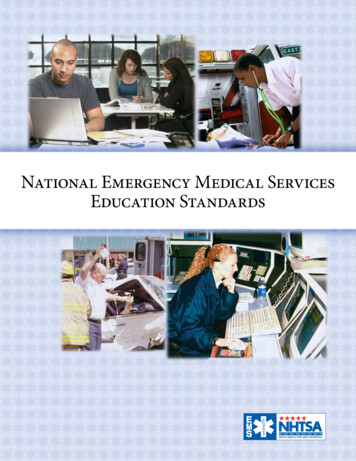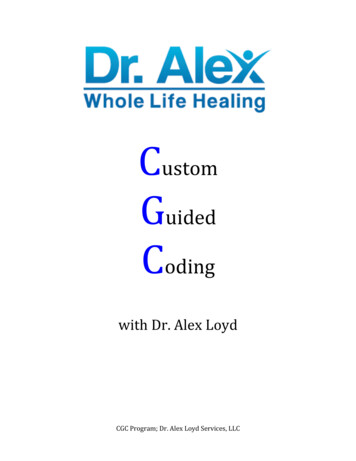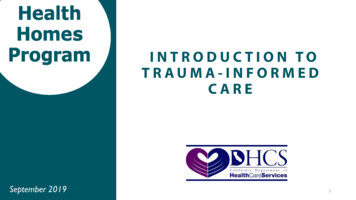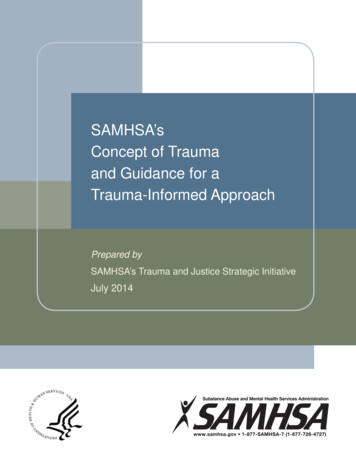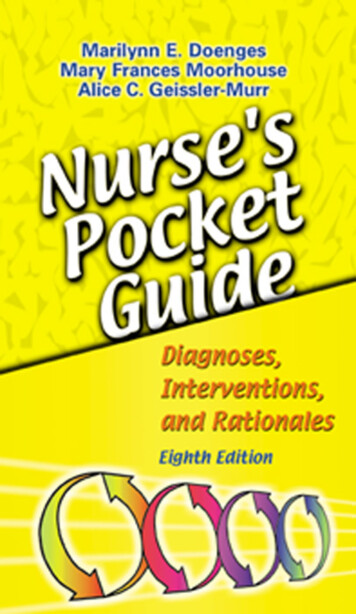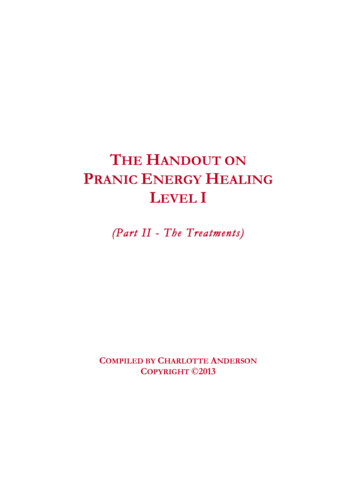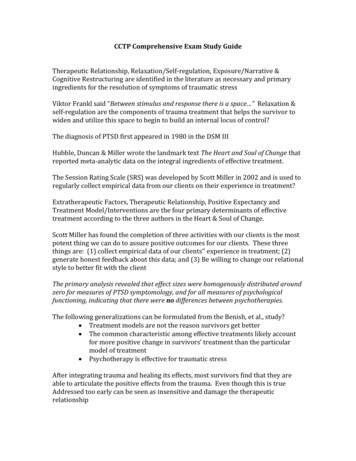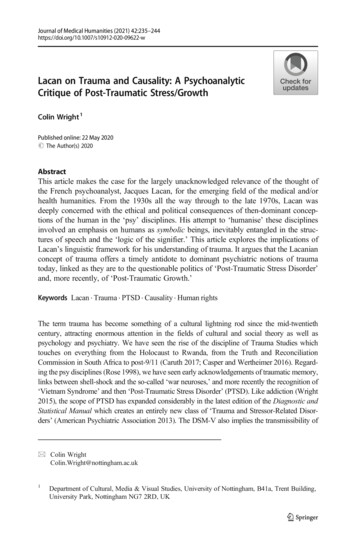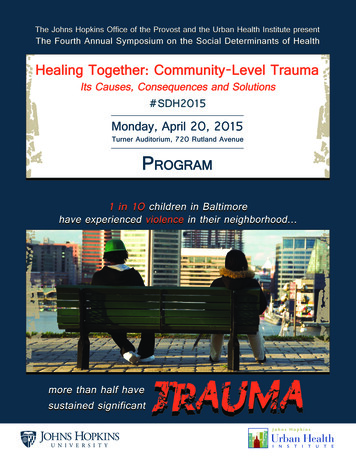
Transcription
Healing Together: Community-Level Trauma - Its Causes, Consequences and Solutions#SDH2015
The Fourth Annual Symposium on the Social Determinants of HealthHealing Together: Community-Level TraumaIts Causes, Consequences and SolutionsJ ohnsM onday , A pril 20, 2015T urner A uditoriumH opkins U niversity E ast B altimore C ampusOBJECTIVES1. To create a learning opportunity that will bring faculty, administration, and students from Baltimore’s areacolleges and universities together with local community-based organizations, city agencies, engaged community residents, service professionals and community leaders to increase awareness of the impact of chronicexposure to trauma and stress on the health in Baltimore.2. To bring together experts (researchers and practitioners) from all relevant sectors to share evidence-basedstrategies and innovative practices that decrease the effects of chronic exposure to stress and trauma onindividual and community health.3. To encourage innovative partnerships for collaboration and practice in the area of trauma-informed communities between Hopkins, area colleges and universities, service organizations and local residents.4. To identify opportunities and priorities for Baltimore during the next few years to alter existing policies,strengthen service systems, and promote awareness of trauma as health issue.CONSIDERATIONS AND APPROACHES1. Engage people at the personal as well as the professional / cognitive level2. At the conclusion of each session (as the panels are switching) ask one question to which people can respondto by email/Facebook/Twitter or just contemplate3. Use ACES questionnaire as survey lead-in to the program4. Have a clear call to action at the end and link with policy2#SDH2015Johns Hopkins Urban Health Institute
Healing Together: Community-Level Trauma - Its Causes, Consequences and SolutionsKEYNOTE SPEAKER - JONATHAN KOZOLIn the passion of the civil rights campaigns of 1964 and1965, Jonathan Kozol gave up the prospect of a promisingcareer in the academic world, moved from Harvard Squareinto a poor black neighborhood of Boston, and became afourth grade teacher. He has since devoted nearly his entirelife to the challenge of providing equal opportunity to everychild in our public schools.Death at an Early Age, a description of his first year as ateacher, received the 1968 National Book Award in Science,Philosophy, and Religion. Among his other major works areRachel and Her Children, a study of homeless mothers andtheir children, which received the Robert F. Kennedy BookAward, and Savage Inequalities, which was a finalist forthe National Book Critics Circle Award in 1992. His 1995best-seller, Amazing Grace: The Lives of Children and theConscience of a Nation, received the Anisfield-Wolf BookAward in 1996, an honor previously granted to the worksof Langston Hughes and Dr. Martin Luther King. Nobel Laureate Toni Morrison wrote that Amazing Grace was “goodin the old-fashioned sense: beautiful and morally worthy.”Elie Wiesel said, “Jonathan’s struggle is noble. His outcrymust shake our nation out of its guilty indifference.”Ten years later, in The Shame of the Nation, a description of conditions that he found in nearly 60 public schools,Jonathan wrote that inner-city children were more isolatedracially than at any time since federal courts began dismantling the landmark ruling in Brown v. Board of Education.The Shame of the Nation appeared on The New York Timesbestseller list the week that it was published.Jonathan’s most recent book on childhood and education is Fire in the Ashes, a sweeping narrative that followsa group of children in a destitute community out of theirinfancy and elementary grades, through their secondary years, into their late teens, and beyond. Some of theirstories are painful and heart-breaking, but others are dramatic tributes to the resilience and audacity of courageouschildren who refuse to be defeated by the obstacles theyface and find their way at last to unexpected and triumphalvictories.This June, Jonathan will publish his most personal bookto date, a story of his father’s life as an eminent physician-- a specialist in disorders of the brain -- and his astonishing ability, at the onset of Alzheimer’s disease, to diagnosehimself, explain the causes of his sickness, and then to narrate, step by step, his slow descent into dementia. The titleof the book is The Theft of Memory. Early readers describe itas a fascinating story of the bond between a father and hisson and the way that bond intensifies even as the father’scogency and verbal gifts progressively abandon him.To Jonathan’s friends and allies in the world of education: Jonathan wants to make it clear that he does not intendto give up the struggle for our children and the challengesour schools are facing in an era of persistent inequality andobsessive testing. He continues to visit children in theirclassrooms and to give encouragement to overburdenedbut devoted principals and teachers. He’s been doing thatfor over fifty years. He isn’t stopping now.Johns Hopkins Urban Health Institute#SDH20153
The Fourth Annual Symposium on the Social Determinants of HealthAgenda#SDH20158:30 – 8:40 a.m.WelcomeRobert Lieberman, PhDProvost, Johns Hopkins University8:40 – 9:25 a.m.Robert Blum, MD, PhD, MPHDirector, Johns Hopkins Urban Health InstituteKeynote: The Shame of the Nation: The Toxic Effects of HyperSegregated and Unequal Education in an Era of Obsessive TestingJonathan KozolNational Book Award–winning author of Savage Inequalities, Death at an Early Age, The Shame of the Nation,and Amazing Grace9:25 – 9:30 a.m.Spoken Word ArtistDerick EbertBaltimore City Youth Poet Laureate9:30 – 10:30 a.m.Panel 1: Context: What is Trauma? Who Experiences It?What Are the Root Causes? What is Required to Heal?Christina Bethell, PhD Moderator / PresenterProfessor, Johns Hopkins Bloomberg School of PublicHealthJames Garbarino, PhDProfessor, Loyola University ChicagoJames Hudziak, MDProfessor, University of Vermont, College of Medicine10:30 – 10:45 a.m.Break10:45 – 11:55 a.mPanel 2: Creating Trauma-Informed Systems: Police,the Community and the CourtsPhil Leaf, PhD ModeratorProfessor, Johns Hopkins Bloomberg School of PublicHealthSam J. Abed, JDSecretary, Department of Juvenile ServicesAnthony Batts, PhD, MBACommissioner, Baltimore City Police DepartmentGary DittmanPastor, Amazing Grace Lutheran Church12:00 – 1:00 p.m.Lunch and Roundtable Discussions1:00 – 1:05 p.m.Spoken Word ArtistKhadijah Butler, “Fatherless”4#SDH2015Johns Hopkins Urban Health Institute
Healing Together: Community-Level Trauma - Its Causes, Consequences and Solutions1:05 – 2:35 p.m.Panel 3: Trauma-Informed SchoolsCheryl Holcomb-McCoy, PhD ModeratorProfessor, Vice Provost for Faculty Affairs, JohnsHopkins UniversitySusan Cole, JDDirector, Trauma and Learning Policy Initiative,Harvard Law School2:35 – 3:40 p.m.Tamar Mendelson, PhDAssociate Professor, Center for Adolescent Health,Johns Hopkins Bloomberg School of Public HealthGodwin HigaPrincipal, Cherokee Point Elementary School, San DiegoPanel 4: What Has Been the Impact of Trauma-InformedInitiatives in Other Cities? What Lessons Can Be Learned?Robert Blum, MD, PhD, MPH ModeratorDirector, Johns Hopkins Urban Health InstituteSteve Berkowitz, MDDirector, Penn Center for Youth and Family TraumaResponse and Recovery3:40 – 3:45 p.m.Christopher Blodgett, PhDChild and Family Research Center, Washington StateUniversityTony Iton, MD, JD, MPHSenior Vice President for Healthy Communities,California EndowmentIvan JuzangFounder and President, MEE ProductionsSpoken Word ArtistMary BowmanPoet, Singer, Advocate for people living with HIV/AIDS, “Honest Poem”3:45 – 5:00 p.m.Panel 5: Trauma Informed Clinical and Support ServicesTina Cheng, MD, MPH ModeratorDivision Chief and Professor, Johns Hopkins MedicineVictor Garcia, MD, FACS, FAAPFounding Director, Trauma Services, CincinnatiChildren’s HospitalLaurel Kiser, PhD, MBAAssociate Professor, Family Informed Trauma TreatmentCenter, University of Maryland School of Medicine5:00 – 5:15 p.m.Annette March-Grier, RNPresident, Roberta’s PlaceLeana Wen , MD, MScCommissioner, Baltimore City Health DepartmentA Call to ActionThe Honorable Stephanie Rawlings-BlakeMayor, City of Baltimore5:15 – 5:30 p.m.Closing RemarksRobert Lieberman, PhDProvost, Johns Hopkins UniversityRobert Blum, MD, PhD, MPHDirector, Johns Hopkins Urban Health InstituteJohns Hopkins Urban Health Institute#SDH20155
The Fourth Annual Symposium on the Social Determinants of HealthBiographiesSam Abed, JD, is the Secretary of the Maryland Department of Juvenile Services (DJS), aposition he has held since 2011. Mr. Abed is responsible for managing the statewide juvenilejustice agency, which strives to make communities safer by getting troubled youth thesupport and services they need to become productive citizens. Prior to coming to Maryland,he held multiple positions in local and state government in Virginia, including DeputyDirector of Operations at the Virginia Department of Juvenile Justice and Commissionerfor the Virginia Commission for National and Community Service. He also worked as aprosecutor for the City of Norfolk and the Sussex County Commonwealth’s Attorney’s Office.Anthony W. Batts, PhD, MBA, is the Police Commissioner of the Baltimore City PoliceDepartment, the eighth largest city police department in the country. With more than threedecades of law enforcement experience, Batts previously served as chief of police for two ofCalifornia’s largest police agencies, located in Oakland and Long Beach, California. Duringhis tenure in California, he presided over major reductions in crime and violence. He also iscredited with reforming the City of Oakland’s police agency to focus on data-driven policing.Batts has received numerous awards, including the Governor’s Award for the most effectivecrime fighting program in California (1991), the NAACP Community Service Award (2006),and the Long Beach Police Department Meritorious Award for Heroism (1992).Steven Berkowitz, MD, is the Director of the Center for Youth and Family Trauma Responseand Recovery and a consultant to the Philadelphia Department of Behavior Health andIntellectual Disabilities. He also is a child and adolescent psychiatrist and an associateprofessor of clinical psychiatry at the University of Pennsylvania, Department of Psychiatry.His work focuses on the development of interventions for children who have experiencedtrauma, and in particular on crisis and early intervention. Dr. Berkowitz is also a nationallyrecognized expert on police-mental health collaborations and was one of the architectsof the Child Development-Community Policing Program, a model that was replicated in15 communities throughout the United States. He has written, lectured and taught extensively in the area ofchildhood trauma and its treatment.Christina Bethell, PhD, MBA, MPH, is a Professor in the Department of Population,Family and Reproductive Health in the Bloomberg School of Public Health at JHU. She is thefounding director of the Child and Adolescent Health Measurement Initiative (CAHMI) andthe National Data Resource Center for Child and Adolescent Health. CAHMI is a nationalinitiative established to advance a high quality, patient- and consumer-centered health caresystem for children, youth and families. Dr. Bethell serves as principal investigator for thedevelopment, validation and implementation of child, youth and family health and healthcare quality tools. She is committed to contributing to the development of systems of carethat proactively address the social and emotional factors in early life essential to promoting health.6#SDH2015Johns Hopkins Urban Health Institute
Healing Together: Community-Level Trauma - Its Causes, Consequences and SolutionsChristopher Blodgett, PhD, is the Director of the Collaborative Learning for EducationalAchievement and Resilience (CLEAR) Trauma Center at Washington State University. TheCLEAR Trauma Center focuses on model development and dissemination to help systemslike early learning, primary health care, and K-12 education become trauma-informedby adapting the science of resilience, brain development, and trauma treatment to theseuniversal systems. Working with partners in more than one dozen communities acrossthe state of Washington, Dr. Blodgett and his team test strategies to improve outcomesby addressing trauma as the principal challenge to the success of any system caring forchildren and families.Robert Wm. Blum, MD, PhD, MPH, is the William H. Gates, Sr. Professor and Chair of theDepartment of Population, Family and Reproductive Health, at the Johns Hopkins BloombergSchool of Public Health as well as the Director of the Johns Hopkins Urban Health Institute.He is a Past-President of the Society for Adolescent Medicine; has served on the AmericanBoard of Pediatrics; was a charter member of the Sub-Board of Adolescent Medicine is apast chair of the Alan Guttmacher Institute Board of Directors and served as chair of theNational Academy of Sciences Committee on Adolescent Health and Development. In 2006,The National Academy of Sciences’ Institute of Medicine elected Dr. Blum into membership.He is a consultant to The World Bank and UNICEF as well as the World Health Organization where he hasserved on the Technical Advisory Group of the Child and Adolescent Health Department as well as the Scientificand Technical Advisory Group of the Human Reproductive Program.Tina Cheng, MD, MPH, is Professor of Pediatrics at the Johns Hopkins School of Medicinewith a joint appointment in the Department of Population, Family and Reproductive Healthat the Bloomberg School of Public Health. She is Chair of Pediatrics at Johns HopkinsBayview Medical Center, Vice Chair of Johns Hopkins Department of Pediatrics and DivisionChief of General Pediatrics and Adolescent Medicine. She also is a principal investigatorof the NIH-funded DC Baltimore Research Center on Child Health Disparities with HowardUniversity and the Children’s National Medical Center and Johns Hopkins Centro SOL(Center for Salud and Opportunity for Latinos). Her clinical work, teaching and researchfocus on child health disparities, violence prevention and primary care models to promote positive youthdevelopment and family health.Susan Cole, JD, M.Ed, is the director of the Trauma and Learning Policy Initiative (TLPI),a joint program of Harvard Law School and the non-profit children’s rights organizationMassachusetts Advocates for Children (MAC). At Harvard she holds a joint appointment asEducation Law Clinic Director and Lecturer on Law and is a Senior Project Director at MAC.Ms. Cole’s work is based on research at the intersection of psychology, education and lawthat links traumatic experiences to a host of learning, relational and behavioral difficultiescontinued on page 8Johns Hopkins Urban Health Institute#SDH20157
The Fourth Annual Symposium on the Social Determinants of Healthcontinued from page 7at school. She is the lead author of Helping Traumatized Children Learn, volumes 1 and 2. Volume 1 summarizesresearch on trauma’s impact on learning and provides a framework for schools to become trauma sensitive.Volume 2, based on TLPI’s direct work in schools, provides a guide for helping schools become trauma sensitive.Both are available at www.TraumaSensitiveSchools.org for no charge.Gary Dittman is the Pastor of Amazing Grace Lutheran Church in the McElderry Parkneighborhood of East Baltimore, where he has served the community since 2009. Thecongregation is deeply committed to being a healing presence in the community, and throughhis leadership, has greatly expanded the programming at the Center for Grace-Full Living, awellness center which houses a food pantry, after-school programming for children in thecommunity and The Revolution Within (TRW). TRW seeks to give community membersspace to heal through various offerings such as mindfulness meditation, martial arts, hiphop dance, aerobics, music appreciation, creative writing, storytelling and acupuncture.The center also offers community gardening and health and cooking classes and collaborates with as manycommunity partners as possible (including the Johns Hopkins community) to create a network of wrap-aroundholistic services.James Garbarino, PhD, is the Senior Faculty Fellow at the Center for the Human Rights ofChildren at Loyola University Chicago and holds the Maude C. Clarke Chair in HumanisticPsychology. Dr. Garbarino has served as a consultant for many organizations, including theNational Committee to Prevent Child Abuse, the National Institute for Mental Health, theAmerican Medical Association, the U.S. Advisory Board on Child Abuse and Neglect, andthe Federal Bureau of Investigation. He serves as an expert witness in criminal and civilcases involving issues of violence and children and has authored or edited several books,including Listening to Killers: Lessons Learned From My 20 Years as a Psychological ExpertWitness in Murder Cases (2015, University of California Press), See Jane Hit: Why GirlsAre Growing More Violent and What We Can Do About It and Children and the Dark Side of Human Experience:Confronting Global Realities and Rethinking Child Development.Victor Garcia, MD, is the Founding Director of the Children’s Trauma Center at the CincinnatiChildren’s Hospital. He also is a professor in Department of Surgery at the hospital anddirector of trauma services. In addition to his work in trauma, he led the effort to establishthe country’s first pediatric weight loss surgery center. He also was the driving force behindCoreChange, an initiative to address poverty, violence and disease in the most blightedneighborhoods of Cincinnati. His ongoing work to eliminate childhood health and socialdisparities has led to numerous awards, including the Martin Luther King, Jr., HumanitarianAward and the National Jefferson Award. Dr. Garcia has an uncompromising belief in thepower of systems thinking and stakeholder engagement to solve society’s most intractable problems.8#SDH2015Johns Hopkins Urban Health Institute
Healing Together: Community-Level Trauma - Its Causes, Consequences and SolutionsGodwin Higa is the Principal at Cherokee Point Elementary School in the City Heightsneighborhood of San Diego. He has been an administrator with the San Diego UnifiedSchool District for the last 15 years and is committed to making discipline policy changeswithin the district. His school was recently recognized by the Huffington Post as one of thefew trauma-informed schools in the nation. Under his leadership, there have been zerosuspensions for the last two years. Mr. Higa is passionate about his students’ success anddemands that all students are treated with the utmost respect so they can succeed andthrive in academics and later in life. His goal is to create a trauma-informed school districtas well as spread the approach to the wider community, the state, and the nation.Cheryl Holcomb-McCoy, PhD, M.Ed, is currently the Vice Provost for Faculty Affairs atThe Johns Hopkins University and a Professor of Counseling and Human Developmentat the School of Education. She specializes in the measurement of multicultural selfefficacy and cultural competence in counseling, the evaluation of urban school counselorpreparation and training, and school counselors’ influence on low-income students’ collegereadiness. Dr. Holcomb-McCoy is currently an Associate Editor of the Journal for Counselingand Development, and she has served on numerous journal editorial boards. Because ofher expertise in college counseling, Dr. Holcomb-McCoy was selected to participate as aconsultant to the Obama Administration’s Reach Higher Initiative.James Hudziak, MD, is Professor of Psychiatry, Medicine and Pediatrics in the College ofMedicine at the University of Vermont. He is director of the Division of Child and AdolescentPsychiatry as well as the Vermont Center of Children, Youth, and Families. In addition,Dr. Hudziak is an Adjunct Professor of Psychiatry at Washington University in St. Louis,Dartmouth Medical School and Professor of Genetics of Childhood Behavior Problems atERASMUS MC of The Netherlands. He is principle investigator on a number of NIH grants,including one of the genomic and neuroanatomical correlates of child abuse. He is knowninternationally for his work in the psychiatric genetics and developmental neuroimaging ofchild and adolescent behavior.Ivan J. Juzang, MBA, is the Founder and President of MEE Productions, Inc., an innovativeresearch and communications company. For two decades, Mr. Juzang and his team havetackled some of the toughest social and public health issues across America. Mr. Juzanghas become a leading expert in the field of behavior health communications and socialmarketing, and he has an exceptional knowledge of the public health, social, and educationalissues faced by underserved communities. He specializes in conducting qualitative researchthat elicits informative, accurate, and authentic responses, using proprietary focus groupresearch and data analysis methodologies he designed in order to determine the motivationand persuasion techniques that best reach and influence any target population.Johns Hopkins Urban Health Institute#SDH20159
The Fourth Annual Symposium on the Social Determinants of HealthLaurel J. Kiser, PhD, MBA, is a psychologist and Associate Professor in the Departmentof Psychiatry at the University of Maryland School of Medicine as well as a team leaderat the UM Family-Informed Trauma Treatment Center. She has investigated the effects ofpost-traumatic stress disorder and physical/sexual abuse on children and adolescents aswell as family processes related to stress and trauma. Her current research focus is on theprotective role of rituals and routines within families, schools, and neighborhoods, and thedevelopment of interventions to strengthen rituals and routines and reduce the effects oftrauma. She co-directs the UM Medical Center’s Child Trauma Clinic and leads Maryland’sworkforce development initiatives regarding child trauma.Phillip Leaf, PhD, is the Director of the Center for the Prevention of Youth Violence andthe Senior Associate Director of the Johns Hopkins Urban Health Institute. Dr. Leaf also is aprofessor in the Johns Hopkins Bloomberg School of Public Health’s Department of MentalHealth with joint appointments in the Department of Mental Hygiene, the Medical School’sDepartment of Psychiatry and Behavior, and the School of Education. Dr. Leaf’s researchinvolves epidemiologic studies of mental illness and substance abuse and the effectivenessof universal and targeted school-based programs. His work focuses on preventing youthviolence and promoting positive youth development.Robert Lieberman, PhD, Provost and Senior Vice President for Academic Affairs, JohnsHopkins University is the 14th provost of The Johns Hopkins University. In this role,Dr. Lieberman is the chief academic officer and second-ranking member of the senioradministration, responsible for promoting and coordinating the university’s teachingand research mission. He oversees the university’s nine schools as well as severalinterdisciplinary programs and academic centers. Provost Lieberman is a well-knownscholar on issues of race and politics in America, social welfare policy and the welfare state.He authored the books Shifting the Color Line: Race and the American Welfare State andShaping Race Policy: The United States in Comparative Perspective.Annette March-Grier, RN, is the Founder and President of Roberta’s House Family GriefSupport Center. As the inspiration and driving force behind Roberta’s House, she workstirelessly to increase the community’s knowledge of children’s grief. Along with theboard of directors and staff, she establishes relationships with foundations, social serviceagencies and other mental health providers in order to provide services to families in need.Ms. March-Grier has facilitated bereavement programs for 30 years and has presentednumerous workshops on grief, stress, and holistic healing in various churches, schools,community centers as well as hospitals. Most recently she was selected by CNN, as one ofthe Top Ten CNN Heroes, 2014 for changing the world. Annette is also the successor and Vice President of herfamily’s nationally recognized funeral service business, March Funeral Homes.10#SDH2015Johns Hopkins Urban Health Institute
Healing Together: Community-Level Trauma - Its Causes, Consequences and SolutionsTamar Mendelson, PhD, is an Associate Professor at the Johns Hopkins BloombergSchool of Public Health and an alumni of the Robert Wood Johnson Foundation Health &Society Scholars program. Trained as a clinical psychologist, her research addresses thedevelopment, evaluation, and dissemination of prevention strategies to improve maternaland child mental health, with a focus on underserved urban populations. Her currentprojects include evaluations of mindfulness-based and cognitive behavioral approaches forimproving emotional and behavioral outcomes in urban middle school students.Stephanie Rawlings-Blake is the current Mayor of Baltimore and a lifelong Baltimorean.Growing up in Baltimore’s Ashburton neighborhood, her parents, Howard and NinaRawlings, instilled in her a passion for public service that has defined her life. She succeededformer mayor Sheila Dixon on February 4, 2010, when the latter resigned. At the time,Mayor Rawlings-Blake was the President of the Baltimore City Council, a position she hadheld since 2007. She was a member of the city council from 1995-2010; in 1995, became theyoungest person ever elected to the City Council at age 25. Under Mayor Rawlings-Blake’sleadership, Baltimore experienced its lowest homicide rate in a generation and madenation-leading progress reforming the school system to improve academic achievement and accountability.Leana S. Wen, MD, MSc, FAAEM, the Commissioner of the Baltimore City Health Department,as well as an emergency physician, patient advocate, and public health leader. Since January,Dr. Wen has been responsible for a department of more than 1,100 employees with wideranging responsibilities that include management of acute communicable diseases, animalcontrol, chronic disease prevention, emergency preparedness, food service inspections,HIV/AIDS and other sexually transmitted diseases (STD), maternal-child health, schoolhealth, senior services, and youth violence issues. The author of the critically-acclaimedbook When Doctors Don’t Listen: How to Avoid Misdiagnoses and Unnecessary Tests, Dr.Wen has given four popular TED and TEDMED talks on patient-centered care, public health leadership, andhealthcare reform.Johns Hopkins Urban Health Institute#SDH201511
Join the Conversation!If you have any questions during today’s Social Determinants of Health Symposium, you can: Post them on Facebook or tweet them on Twitter using#SDH2015 Email them to us at urbanhealth@jhu.edu with#SDH2015 as the subject line.Who we areEstablished in 2000, the UHI serves as an interface between Johns Hopkins University and theBaltimore community in which it resides. Together with its university and community partners, theUHI explores ways that the research, teaching, and clinical expertise of the University can be betterharnessed for the benefit of the residents of Baltimore.Our MissionTo serve as a catalyst that brings together the resources of Johns Hopkins Institutions with theCity of Baltimore, and especially East Baltimore, to improve the community’s health and well-being,and in so doing serve as a model of community-university collaboration regionally and nationally.Contact E US ON LOW US ON TWITTER@JHUrbanHealth
tion is Fire in the Ashes, a sweeping narrative that follows a group of children in a destitute community out of their infancy and elementary grades, through their second-ary years, into their late teens, and beyond. Some of their stories are painful and heart-breaking, but others are dra-ma

